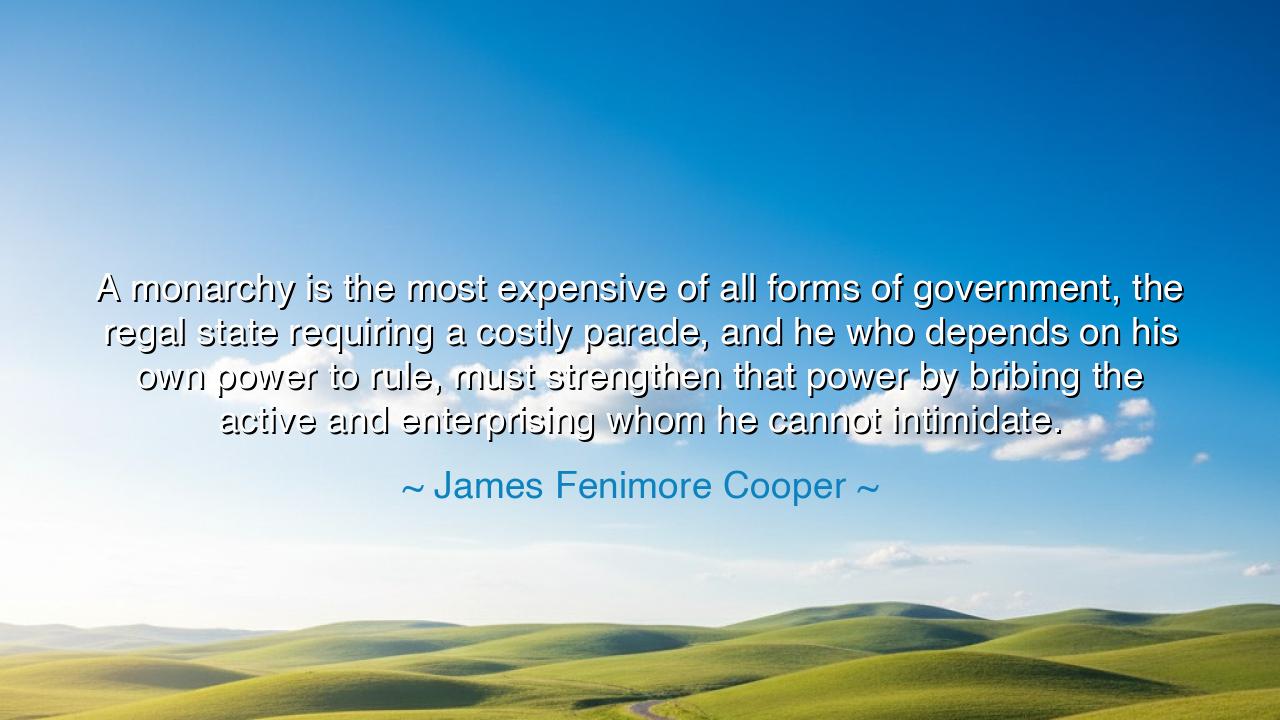
A monarchy is the most expensive of all forms of government, the
A monarchy is the most expensive of all forms of government, the regal state requiring a costly parade, and he who depends on his own power to rule, must strengthen that power by bribing the active and enterprising whom he cannot intimidate.






"A monarchy is the most expensive of all forms of government, the regal state requiring a costly parade, and he who depends on his own power to rule, must strengthen that power by bribing the active and enterprising whom he cannot intimidate." Thus spoke James Fenimore Cooper, the great American author whose pen carved deep truths into the soul of his age. Known to many for his tales of wilderness and frontier, Cooper was also a philosopher of liberty — a man who understood that the price of power is always paid by the governed. In these words, he revealed the inner corruption of monarchy, the most gilded and yet the most ruinous of governments. For where one man reigns by birthright, the people pay in coin, in spirit, and in freedom to uphold the illusion of his glory.
In the time of kings and empires, power was not earned through service, but inherited through blood. Thrones were built not on the strength of justice, but on the spectacle of majesty — the costly parade of crowns, palaces, and armies meant to dazzle the eye and command the will. Cooper, writing in the 19th century, looked upon the monarchies of Europe with the eyes of a republican. He saw their splendor, yes, but also their burden — the endless drain upon the people’s labor to maintain the pomp of royalty. The jewels on the crown were paid for by the sweat of farmers and merchants; the throne stood high only because the many knelt beneath it. To him, this was not strength, but weakness disguised as grandeur, for any government that must rely on spectacle to maintain its rule reveals the emptiness of its authority.
The heart of Cooper’s wisdom lies in the second half of his thought: “He who depends on his own power to rule, must strengthen that power by bribing the active and enterprising whom he cannot intimidate.” Here he uncovers the timeless truth that tyranny, whether clothed in silk or steel, cannot stand upon fear alone. The bold, the capable, the thinking men and women — these cannot be subdued by threats. Therefore, the tyrant must buy their loyalty, showering them with favors, wealth, and titles. Thus arises the courtier, the flatterer, the sycophant — a class of people who serve not truth or country, but the personal advantage gained from pleasing the ruler. The result is a government hollow at its core, one that rewards obedience and punishes integrity, until corruption becomes its lifeblood and deceit its law.
History bears endless witness to this pattern. Consider the splendor of Versailles, the palace of Louis XIV, the “Sun King.” Its mirrors reflected the brilliance of royal power, yet beneath its marble floors lay the misery of France. To secure the loyalty of his nobles, Louis surrounded them with luxury, distracting their ambition with indulgence. They bowed not to virtue, but to privilege — their allegiance purchased with gold and comfort. For a time, the illusion held; France gleamed with culture and power. But as the people’s burden grew heavier, and the treasury drained by the monarch’s vanity, the kingdom’s foundations rotted. The grandeur of monarchy led not to strength, but to revolution. The Sun King’s heirs would pay for that brilliance with their heads.
Cooper’s insight reaches beyond the age of kings into all systems of absolute power. For tyranny wears many masks — the crown of monarchy, the uniform of dictatorship, the smile of populism. Wherever one man or one small circle claims dominion over the many, the same forces appear: wasteful display, flattery, and fear. And wherever the ruler must rely on bribery to silence dissent, the seeds of decay are sown. True strength, Cooper teaches, comes not from the treasures of the throne, but from the virtue of a free people. A government built on justice and consent needs no parade to prove its worth, nor bribes to keep its citizens loyal.
The meaning of Cooper’s words, then, is not merely a condemnation of monarchy, but a defense of moral and civic strength. A government that depends on deception or luxury to maintain its rule betrays its own fragility. The true foundation of power is not wealth, but trust — not spectacle, but service. A free people, wise and industrious, require no master to command them. They are governed best when they govern themselves through virtue and reason. But when they grow complacent, when they envy power or seek comfort in submission, they pave the road for the return of kings.
The lesson for all ages is clear: liberty requires strength — not the strength of armies or wealth, but of character. Do not be dazzled by grandeur or swayed by gifts from the powerful. Remember that every coin spent to glorify rulers is taken from the sweat of the ruled. Let the people cherish simplicity in government and honesty in those who serve it. Let them demand not parades and palaces, but justice and truth. For when the people grow wise and self-reliant, no tyrant can bribe them, and no crown can rule them.
So remember the wisdom of James Fenimore Cooper: that monarchy, or any form of absolute rule, is the most expensive illusion humanity can afford. It consumes gold, corrodes virtue, and corrupts the hearts of men. But a people who live by their own labor, governed by their own reason, stand richer than any king — for they are free, and freedom is the one treasure that cannot be bought, bribed, or stolen.






AAdministratorAdministrator
Welcome, honored guests. Please leave a comment, we will respond soon